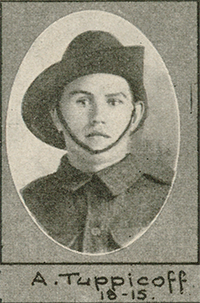Alexis Tupicoff
| Russian spelling | Алексей Васильевич Тупиков |
|---|---|
| Born | 17.03.1895 |
| Place | Perekopnoe, Samara, Russia |
| Ethnic origin | Russian |
| Religion | Russian Orthodox |
| Father | Vasily Tupicoff |
| Mother | Tatiana Timofeevna |
| Contacts | Brother Nicholas Tupicoff |
| Residence before arrival at Australia | Lived in Manchuria for 12 years, served in the Russian Army (artillery) |
| Arrived at Australia |
from Russia on 16.03.1914 per Empire disembarked at Brisbane |
| Residence before enlistment | Charleville, Kingaroy, Mount Morgan, Qld |
| Occupation | 1916 railway labourer, 1921 labourer |
| Naturalisation | 1921 |
| Residence after the war | Ipswich, Coominya, Atherton, Ipswich, Qld |
| Died | 1971, Qld |
Service #1
| Service number | 5763 |
|---|---|
| Enlisted | 9.02.1916 |
| Place of enlistment | Rockhampton, Qld |
| Unit | 15th Battalion, 42nd Battalion |
| Rank | Private |
| Place | Western Front, 1916-1917 |
| Casualties | WIA 1917 |
| Final fate | RTA 27.08.1917 |
| Discharged | 30.11.1917 MU |
Materials
Digitised naturalisation (NAA)
Digitised service records (NAA)
Digitised Embarkation roll entry (AWM)
Indulgence passage to Russia Private A Tupicoff (NAA)
Alien registration (NAA)
Mr A Tupicoff - compensation (NAA)
Repatriation Medical case file 1 2 (NAA)
Crematoriums index (NAA)
Blog article
From Russian Anzacs in Australian History:
Some family members met up in Australia, later enlisting together in the AIF -- like the Tupicoff brothers, Nicholas (whom we encountered earlier on the trans-Siberian, escaping conscription) and Alexis. Nicholas had been brought up by his well-to-do stepfather in Harbin, and had already begun work there as a Chinese interpreter with an American company: 'He could speak Chinese, Russian, German, Polish and English. He worked, lived, and dressed as a Chinaman ...'. Arriving in Brisbane in 1912, Nicholas found work labouring on the railways and also, using his languages, as a shipping clerk meeting the boats in Brisbane. 'He did not like the work on the railway line and decided to go back to Russia. He came down to Brisbane to send a letter to Alec [his brother Alexis] and went to meet a boat and found Alec on that boat.' So, instead of returning to Russia, where both their parents were now dead, the brothers remained together, finding rural work in Queensland until they enlisted.
[...] On 31 May [1917] the Allies launched a seven-day bombardment of the German positions, followed by a series of explosions set off in tunnels beneath the German lines, before the attack started on 7 June. A lot of Russian tunnellers were involved in the mining of the trenches, and other Russians in the attack. In this engagement Alexis Tupicoff received a severe facial wound, leaving him with a disfigured nose, mouth and throat.
[...] Some of them [...] believed that in Russia they would be able to manage better: they were suffering from their wounds and the only employment they could find in Australia involved hard physical work. Alexis Tupicoff (who was severely wounded at Messines), for instance, argued in his application to the Repatriation Department in April 1918, 'I cannot get light work here and my family is there. The work I have now in Ipswich workshops is too hard for me.' In Samara, where he wanted to go, in the hope of finding work in an office or on a farm, 'I have my friends who will assist me'. The department rejected his application on the grounds that 'he proposes to go to a country which is at peace with the enemy'.
Gallery

Alexis Tupicoff
Queenslander Pictorial, supplement to The Queenslander, 8 July 1916, p. 24
 Russian Anzacs
Russian Anzacs